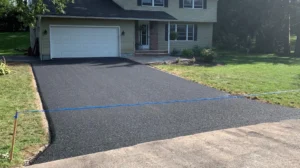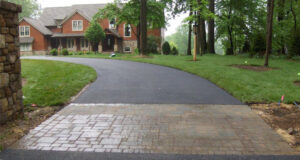While DIY asphalt driveway installation might look easy on YouTube videos, it’s a project that requires specialized equipment and a professional crew. Additionally, asphalt driveways require regular maintenance, including sealing and cleaning twice a year.
Paving Companies Charleston SC is durable and easy to maintain with the right care. Here are some reasons why an asphalt driveway is a smarter investment than concrete.

Asphalt is durable, making it an excellent choice for homeowners who want their driveway to withstand the elements. It’s resistant to the freeze-thaw cycle, and road salt, compared to concrete, can easily deteriorate from these chemicals. Asphalt is also less vulnerable to major shifts in weather conditions, able to absorb heat more quickly in the summer and melt snow quicker in the winter.
The darker color of asphalt helps to hide dirt and stains. It’s easy to get an asphalt surface looking like new again by having it resurfaced every few years. This protects your asphalt driveway from the elements and makes it look more attractive. Resurfacing also helps to prevent cracks and other damage from forming so it can last longer than your driveway would otherwise.
Another advantage of an asphalt driveway is that it can support heavy vehicles and trailers. According to Angi, an average residential asphalt driveway is three inches thick, which can hold up to most passenger cars and even vans and lightweight trucks. However, if your driveway is home to large campers and trailers, ask your pro to lay down a thicker layer of asphalt.
In addition to minimizing runoff and improving drainage, porous asphalt can help with stormwater management by allowing rainwater to seep through to an underlying stone bed rather than pooling on the driveway’s surface. This helps to reduce the risk of flooding and erosion, which can be a problem for many homeowner’s properties. Porous asphalt can cost more than traditional asphalt, but the extra investment is worth it for homeowners.
Asphalt driveways are much less expensive than concrete, making them ideal for homeowners who want a long-lasting, durable driveway without the high cost. In addition, installing an asphalt driveway is relatively simple and quicker than constructing a concrete one, which helps keep labor costs low.
Besides being affordable, an asphalt driveway is easy to maintain and repair. Asphalt contractors can quickly fix cracks and potholes, providing a safe and durable surface for your vehicle. Furthermore, the black color of asphalt hides oil stains and rust, making it easier to clean and maintain.
In cold climates, an asphalt driveway is less likely to crack or break than a concrete one. Asphalt naturally warms up in the sun, melting snow rather than hardening it. Additionally, asphalt is more resistant to freeze-thaw cycles and de-icing salts. This is why many people choose to use asphalt in their northern-climate homes.
While it’s not as durable as concrete, asphalt can last between 20 and 30 years if well-maintained. However, this lifespan can be affected by weather conditions and maintenance.
If you live in a rainy climate and need a driveway that drains properly, porous asphalt is the best choice. This type of asphalt allows water to flow through the material rather than running off the surface, which saves money on excavation and grading. However, there are better options for freeze-thaw climates than this type of asphalt because rapidly expanding ice can rupture the pavement.
Although asphalt is a great material for your driveway, you must consider its drawbacks before deciding. For example, it provides more options for style and customization than concrete. However, some manufacturers now incorporate recycled materials into asphalt mixtures to improve aesthetics.
Asphalt is less prone to cracking and deteriorating from seasonal weather changes than concrete, making it a good choice for high-traffic areas or homes that house large trucks or RVs. It’s also more resistant to the freeze-thaw cycle and de-icing salts, which can pit or blot concrete.
It’s also relatively easy to maintain asphalt compared to other paving materials. A small amount of weekly or monthly tasks can maximize an asphalt driveway’s lifespan. For example, sweeping the surface helps prevent abrasive dirt and gravel from wearing away the material. Additionally, removing engine oil or gas drips as soon as they occur can help avoid or reduce staining. If stains do occur, using an asphalt-safe cleaning product can help eliminate them.
A final point to remember is that asphalt performs well in warm climates. At the same time, concrete can heave or crack in cold temperatures (especially if improper steps are taken to winterize the surface). In addition, it’s important to note that new asphalt must be “cured” before it’s safe to drive on, which usually takes a few days. During this time, the surface will feel soft to the touch and may leave impressions on the wheels of vehicles.
Once the curing process is complete, the asphalt sealer should treat the surface. Applying a fresh coat of sealant every few years can help keep the pavement looking brand new. It’s also a good idea to repair any holes or cracks as they occur, as the material is much easier to fix than concrete. Most homeowners can complete these repairs independently with minimal effort, saving them money versus hiring a professional.
Asphalt is an ideal option for driveways because it can be applied to various surfaces. Additionally, the material is easily molded to fit the surface of your driveway, making it a popular choice for commercial and residential paving projects. This versatility also benefits homeowners looking for a cost-efficient, durable, and long-lasting material.
While concrete is an excellent choice for a driveway, asphalt is less costly and easier to install. These factors make it a more attractive option for homeowners on a budget or those wanting to complete their projects quickly.
Regarding maintenance, a homeowner can expect fewer issues with an asphalt driveway than a concrete one. Because asphalt is designed to shrink and expand with temperature fluctuations, it’s less prone to cracking. Its flexibility helps it resist damage from the freeze-thaw cycle and de-icing salts, providing superior performance during inclement weather.
A typical asphalt driveway will require periodic seal coatings and resurfacing, but these services are typically less expensive than concrete. Additionally, the dark color of asphalt helps hide stains, reducing the need for frequent cleaning and maintenance.
Choosing the right driveway material is important for homeowners and business owners. It’s important to consider how your driveway will be used and the climate in which you live. With proper care and maintenance, a driveway made from asphalt can last decades.
If you want to upgrade your driveway, contact Precision Asphalt Maintenance today to learn more about how an asphalt driveway can improve your property and home value. We’ll happily answer any questions and help you choose the best material for your needs.
Asphalt driveways are fairly easy to repair. Most repairs can be done without professional help and should not require more than some elbow grease. However, if you are uncomfortable doing the job, consider hiring a local asphalt contractor to do it quickly and safely.
When repairing an asphalt driveway, the first thing to do is to remove any debris accumulated in the cracks and potholes. You should also clean the surface to ensure it is free of dirt, dust, oil, and other substances that could prevent the repair materials from adhering properly.
You can use rubberized asphalt emulsion crack filler for small cracks, which can be applied with a caulking gun. You can fill larger cracks with cold patch asphalt and tamp it down. You can also supply large holes in an asphalt driveway with base gravel and pour cold patch asphalt.
Once you’ve repaired any cracks or holes in your asphalt driveway, you can apply a coat of sealer. This will protect the asphalt from UV damage and help keep moisture from penetrating it and causing deterioration. Sealing an asphalt driveway is recommended every three to five years.
The best way to avoid expensive repairs in the future is by performing preventative maintenance. This includes washing your asphalt driveway twice a year to remove dirt, grime, and other substances that may cause damage when it rains or snows. It’s also important to check for signs of damage regularly and perform repairs as soon as possible before the problem worsens. This will keep your asphalt driveway looking its best and extend its lifespan.
